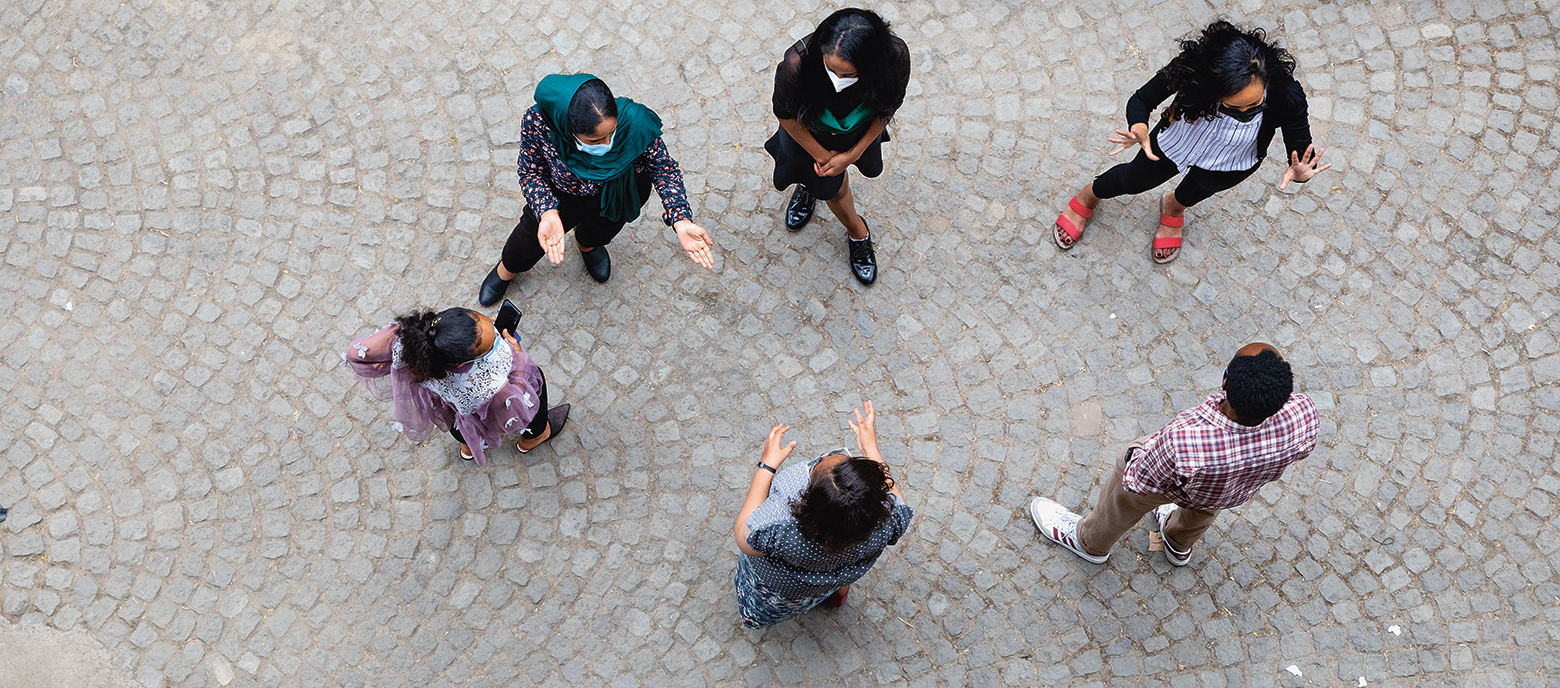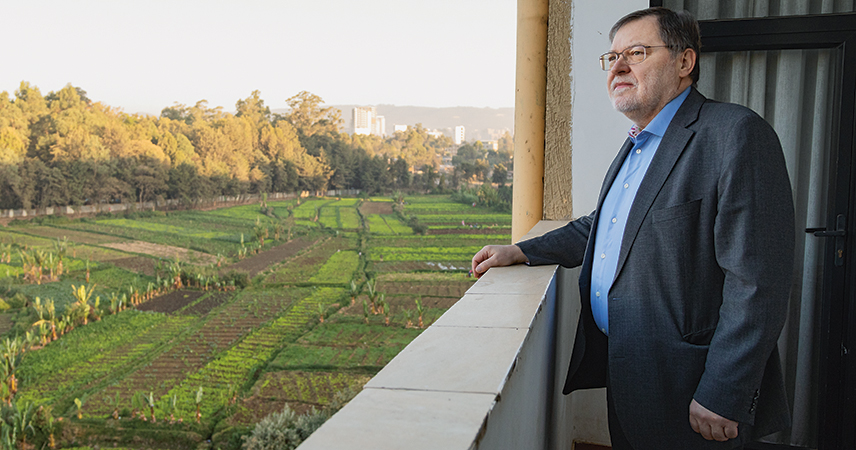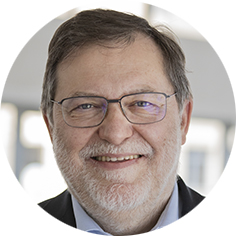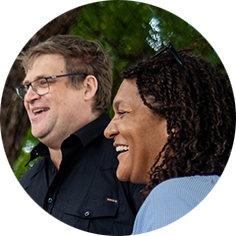Report
Keeping the dialogue going
7:00
Peter Palesch gazes into the distance, at the fields and trees that line the banks of a small river. Some farmers are already hard at work, birds of prey are circling. Every morning, the GIZ country director spends a moment on the balcony of his flat in central Addis Ababa. He has an unusual view in this generally bustling metropolis that is home to four million people. Palesch enjoys these few moments of peace before the start of yet another busy working day. Shortly afterwards, he meets his driver, Yoseph Kassahun, in the basement garage. Kassahun drives him and a colleague to the office. The traffic is still relatively light, and the journey through the city centre, where high-rise office blocks alternate with small businesses, is fairly smooth.
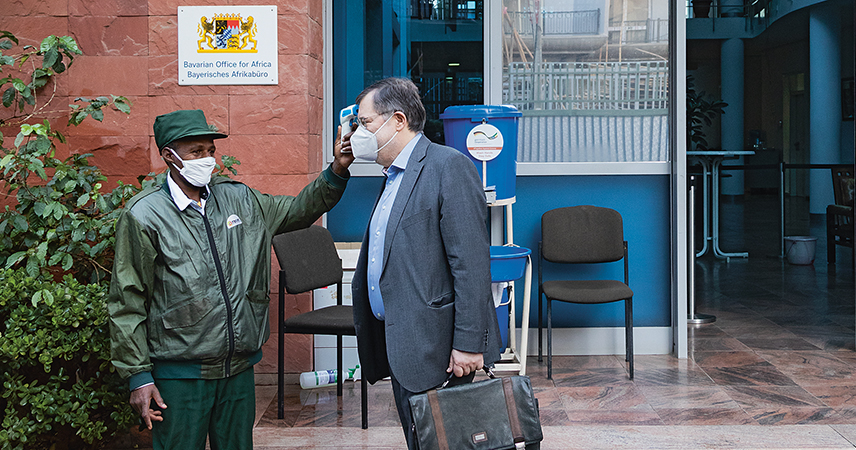
7:45
On their arrival at the GIZ office, a modern red-brick building with lots of glass, a porter first takes their temperature – COVID regulations. All clear! They walk up to the third floor. No mean feat given that Addis Ababa is the highest capital in Africa at an altitude of some 2,200 metres above sea level. Peter Palesch has been pushing for a lift for some time. He is optimistic that progress can be made on the project this year. His main concern are staff members with physical disabilities. Some of them only manage the daily ascent with the help of colleagues. As soon as he makes it to the office, Palesch makes a beeline for his computer. He always dedicates the first hour of his working day to dealing with emails.
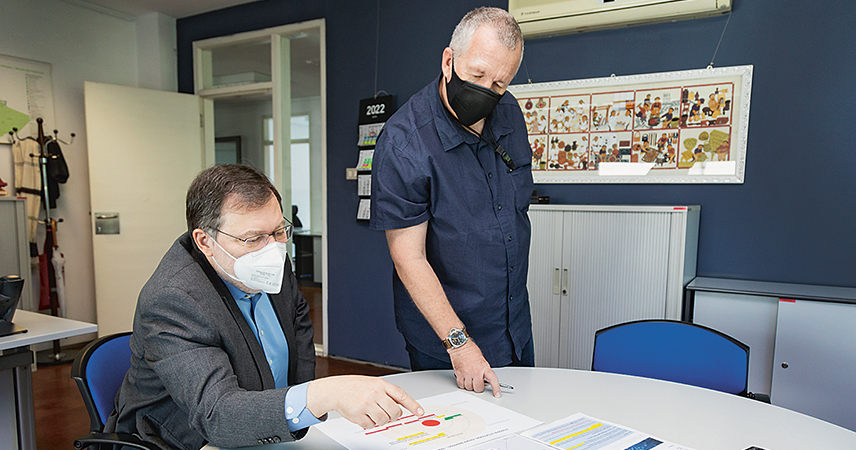
9:00
Peter Palesch meets briefly with the office management team, as he does every morning. His deputy would normally attend, but she is currently on leave. The head of HR, the security advisor and the head of the administrative and financial division complete the management team. Today they discuss reports of criminal attacks in Addis Ababa and what precautions should be taken. The short meeting also looks at how to get a larger delivery of goods through customs clearance. The long delays in issuing visas and residence permits for GIZ staff are another topic on the agenda.
9:30
Now it’s time for the managers of projects in the region of Tigray in the north of Ethiopia, scene of armed hostilities. Since civil war broke out in the region, the group has met once a week to discuss the current situation. Soon it will be time for the next flight to Mekelle, the capital of Tigray. Because the conflict has made bank transfers impossible, a ‘courier’ has to be appointed every month to take the salaries to the office there in cash. As soon as it has been decided who is to travel, this must be reported to the United Nations, which operates regular flights to the north of the country. Money is also an issue for the team with respect to the rent for the office and vehicle leasing charges in Mekelle, which also need to be paid.
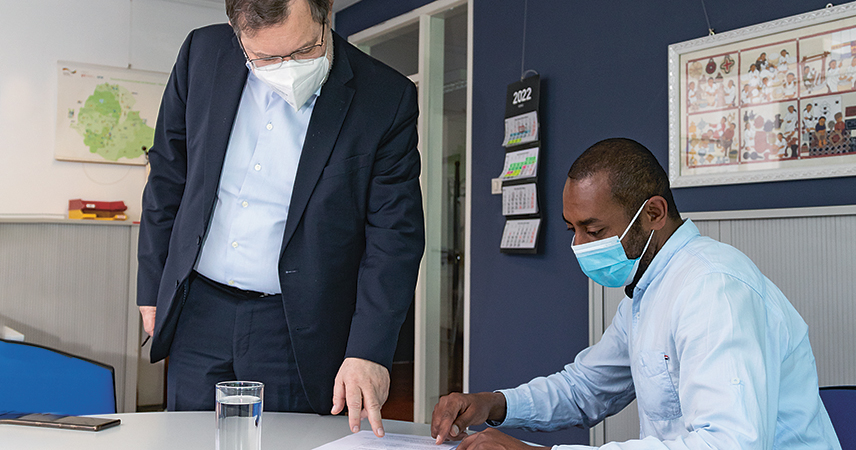
10:00
Dagmawi Feleke arrives in Peter Palesch’s office for the annual staff assessment and development talk. Feleke is head of the HR division and has worked for GIZ for many years. The country office in Ethiopia has over 800 staff members. That’s a lot of responsibility for Dagmawi Feleke, but also for Peter Palesch. After the actual staff assessment and development talk, Feleke raises the issue of recent sharp price rises in Ethiopia. He proposes that GIZ rethinks its salary structure, because people can afford less and less with their salaries. He warns that other companies have already enticed valuable staff members away. The two of them also discuss the options for retaining staff working on projects that will end soon. Palesch will continue to work on both issues with his team and endeavour to resolve the matters.
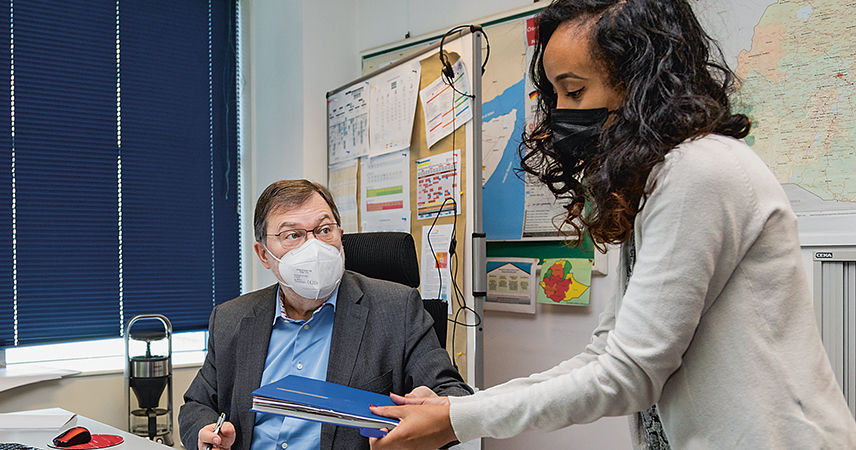
11:30
Peter Palesch works at his computer, but the office door stays open – a conscious sign that he is always available if staff have a problem. The door is only closed if a meeting is in progress. The pandemic means that staff are less frequently able to discuss things directly, much to Palesch’s regret. Today, however, Constanze Gütz comes in to discuss a problem with her visa. Gütz works in Addis Ababa on a traveller arrangement. Most of the time she works at Head Office in Eschborn, but she is currently on assignment in Ethiopia for several months. She is supporting the procurement division. GIZ’s work in Ethiopia focuses on training and sustainable growth for decent jobs as well as BMZ’s One World – No Hunger special initiative, and peaceful and inclusive societies.
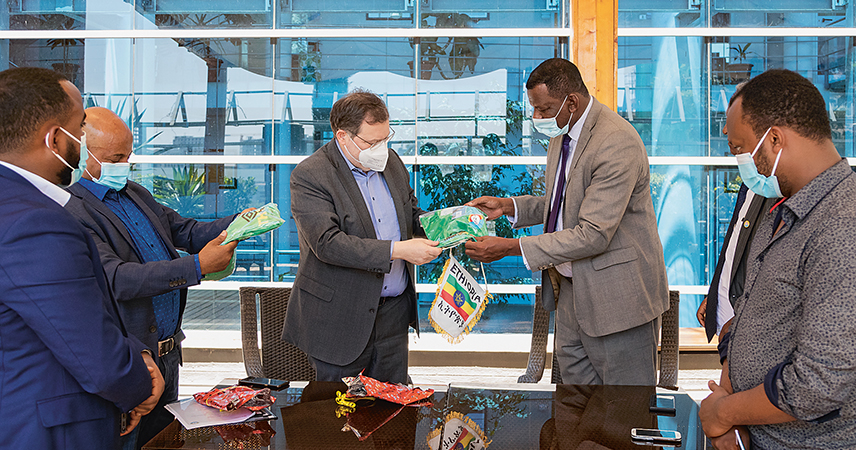
12:00
Peter Palesch and representatives of the Ethiopian Football Federation (EFF) meet in the conference room of the GIZ building for the official signing of a joint project. GIZ is to support the planned football academy in Addis Ababa. The support will target children, young people and local community to establish sport for development in the academy, the Center of Football Excellence. GIZ undertakes to renovate the existing football pitch and also create training areas as well as a new pitch.
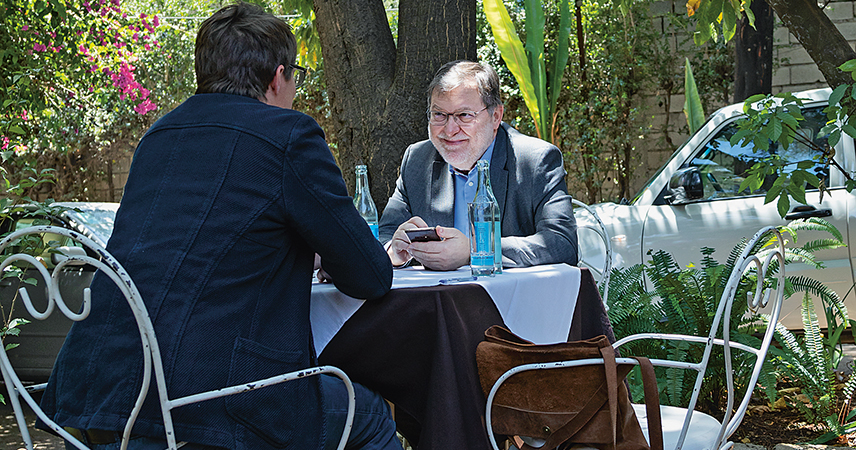
13:00
In an Italian restaurant near the German Embassy, Peter Palesch meets Benjamin Hecker, one of three economic cooperation officers at the Embassy. Palesch doesn’t usually stop work for lunch, but he makes an exception for working lunches like this one. With Hecker he discusses a GIZ regional project aimed at better managing migration in the Horn of Africa. The project was first launched in 2016 and is scheduled for completion this year, but an additional phase is planned. A GIZ delegation is currently in Addis Ababa to make the necessary preparations. Ideas on this are to be shared, including with the German Embassy. Peter Palesch and Benjamin Hecker begin this process and plan out the next meetings.
14:30
Back in the office, a staff member from Head Office in Eschborn appears on Palesch’s monitor. She supports managers in HR matters. They discuss how the country office can improve its planning capacities in the long term: how can vacancies be filled sooner, and managers offered better professional development? They also discuss the current COVID-19 situation in Ethiopia and the impacts of the GIZ COVID measures on the country office.
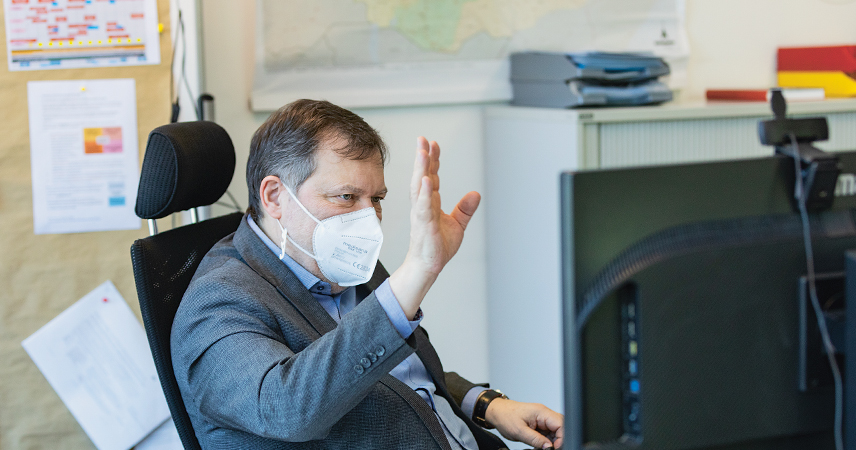
15:30
Time for an online meeting with Markus Koerner, one of whose responsibilities is to find new ways of using land sustainably, particularly in view of climate change. Every two weeks, Palesch meets individually with each of the 15 staff members who report directly to him. Koerner is one of them and would like to discuss a request received from the Ethiopian Ministry of Agriculture. The ministry has received about 35,000 tablet computers from a non-GIZ project and is now looking for ideas on how to use them effectively. Koerner suggests using them to deliver further training to agricultural extension agents deployed nationwide. All training materials are currently printed; digitalisation could make disseminating knowledge easier.
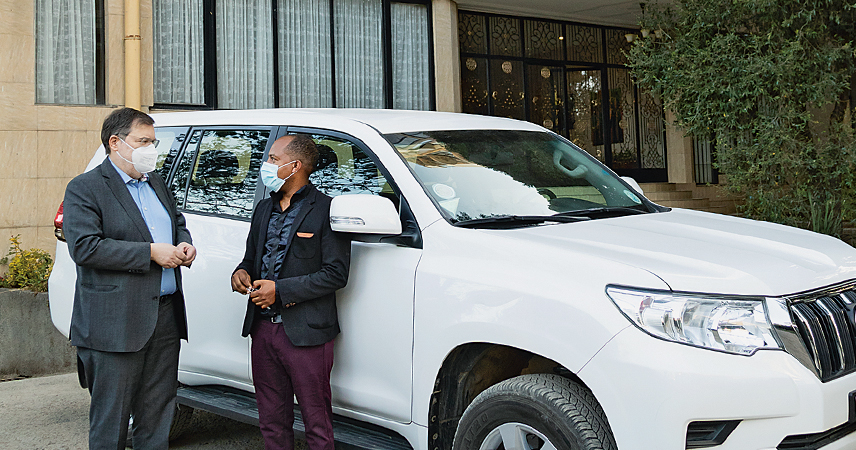
17:00
Yoseph Kassahun is waiting for Peter Palesch in the car in front of the GIZ building. The driver seeks eye contact with Palesch. A brief pause, a nod, and the drive home begins. In the morning, the journey took only ten minutes. Now, in the afternoon rush hour, it can easily take three quarters of an hour.
akzente 1/2022
Far away – and yet so near
GIZ voices
